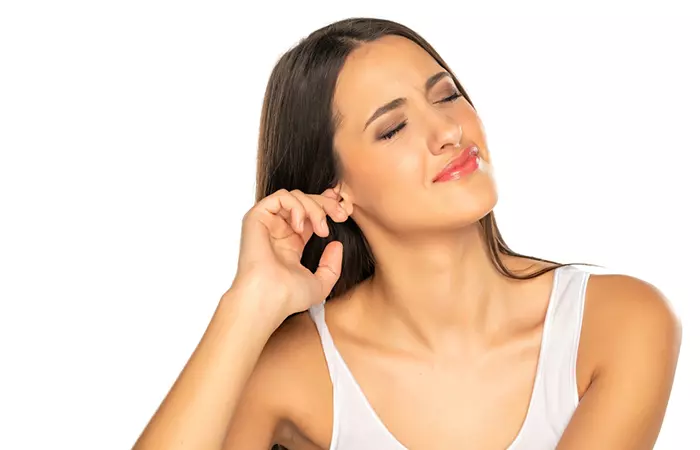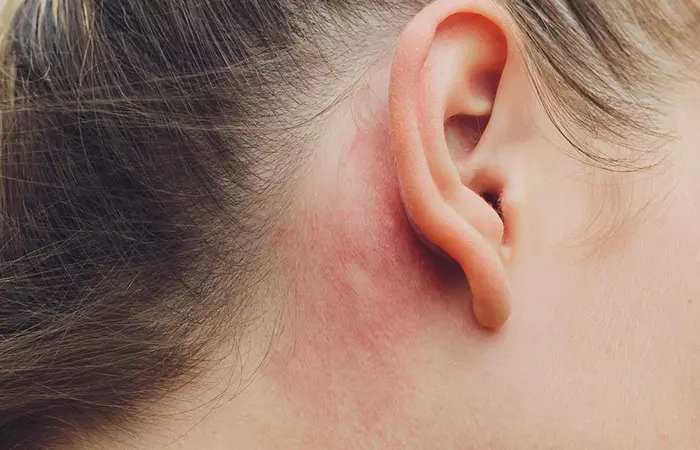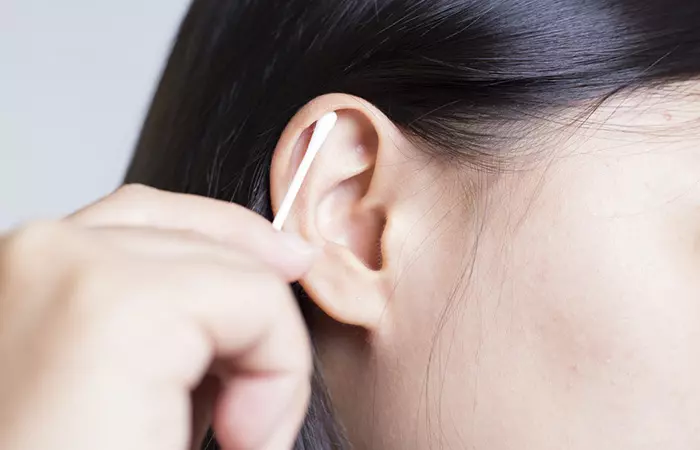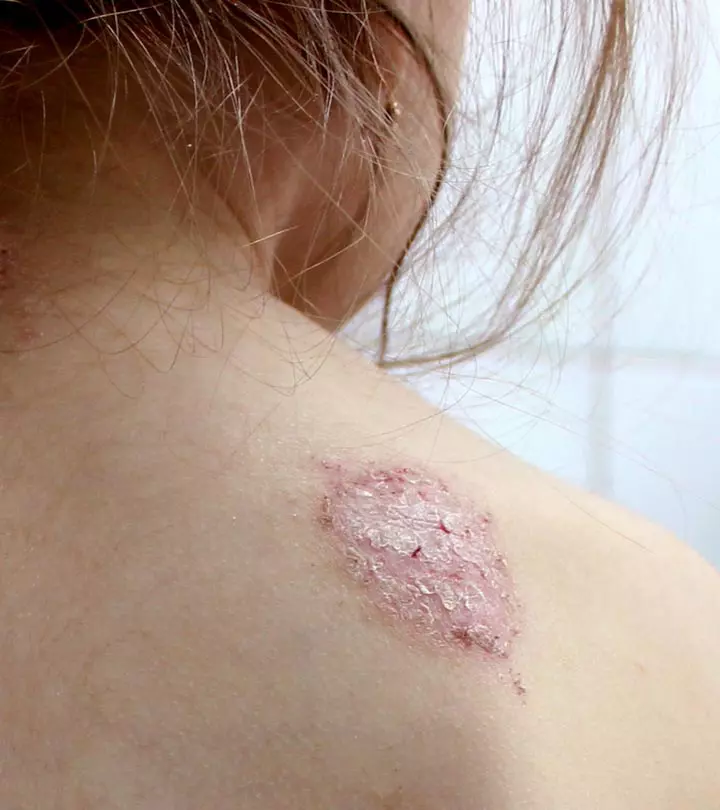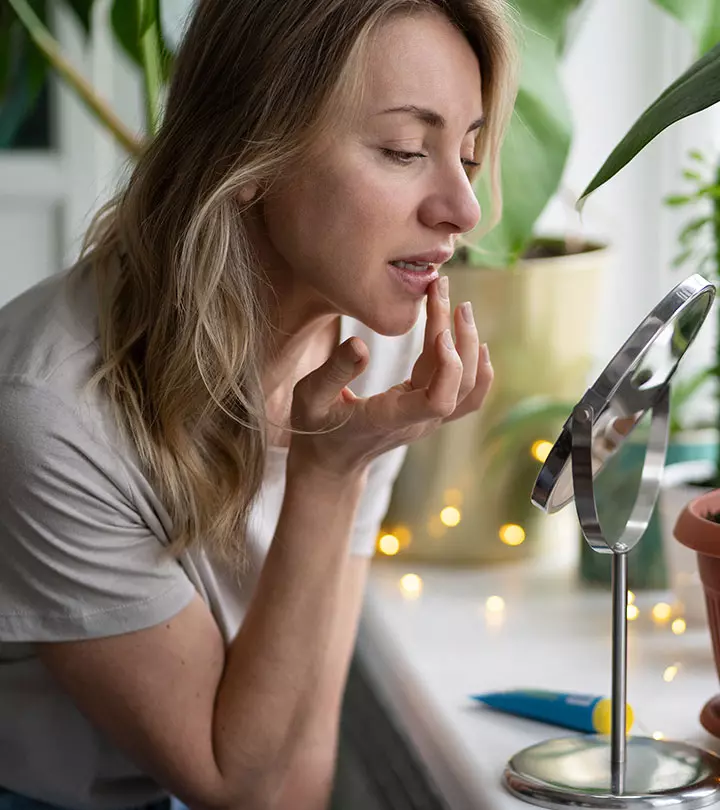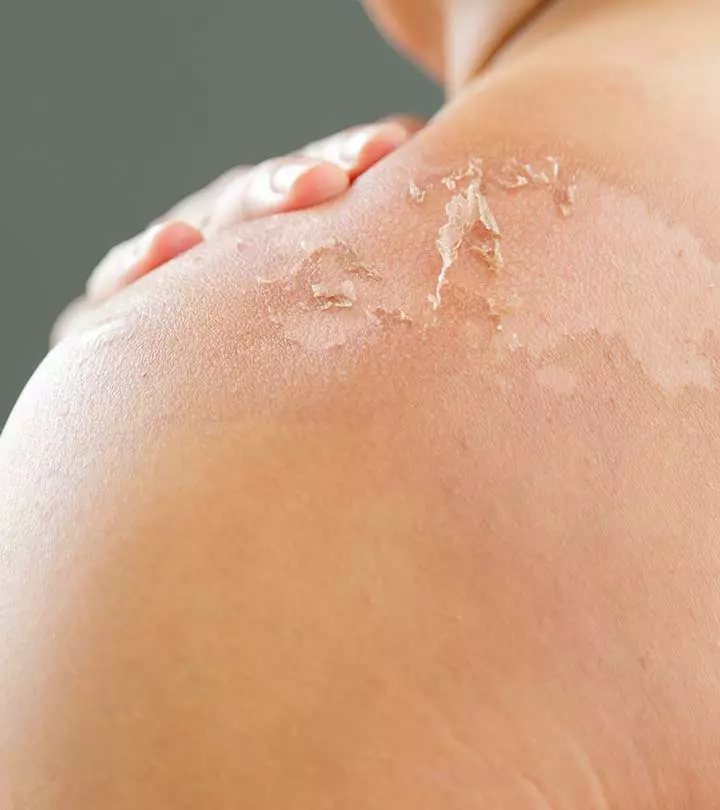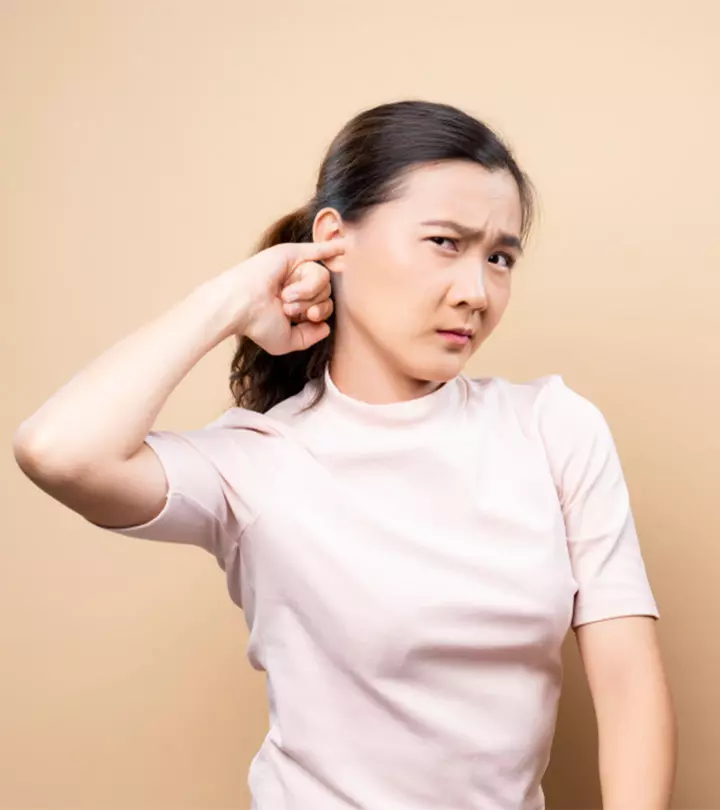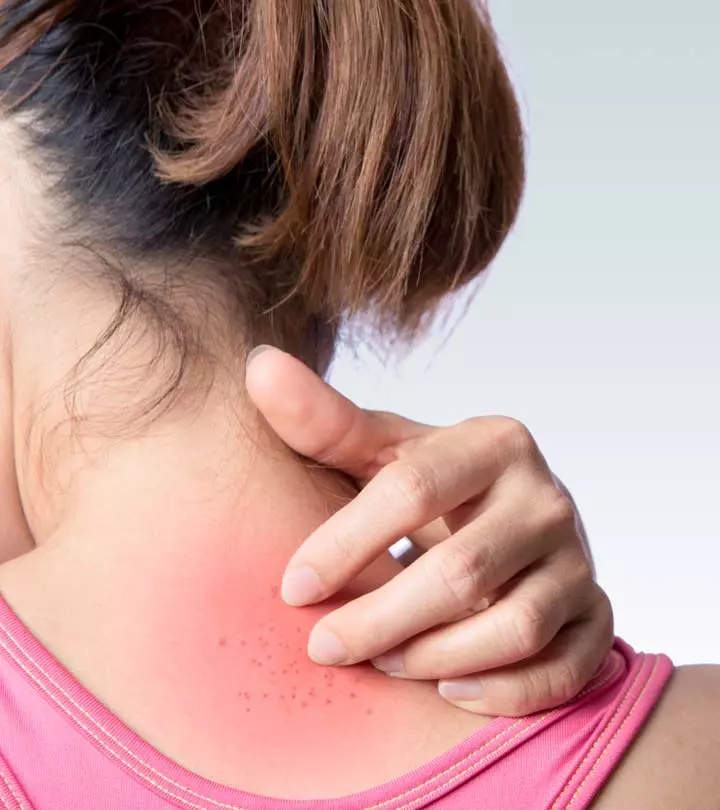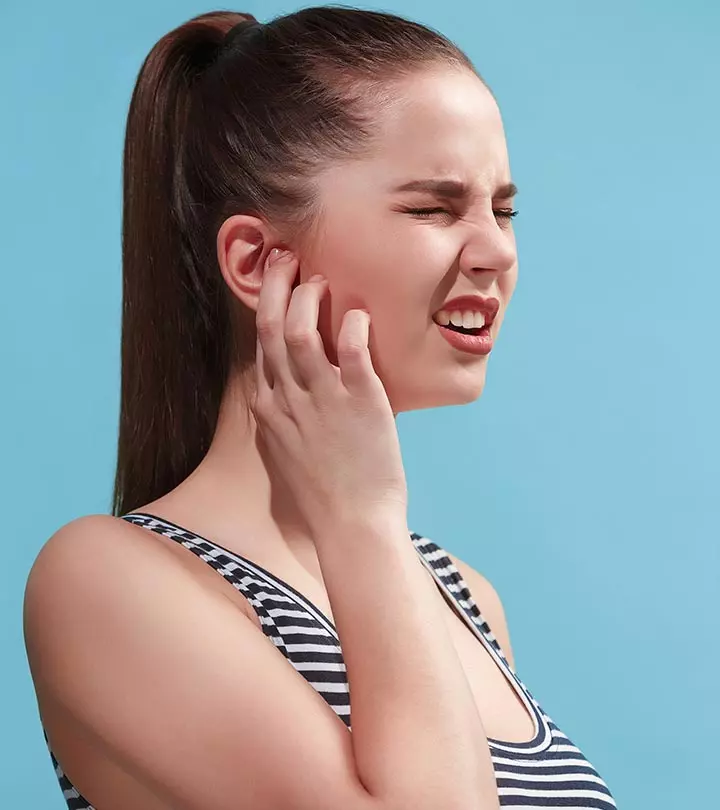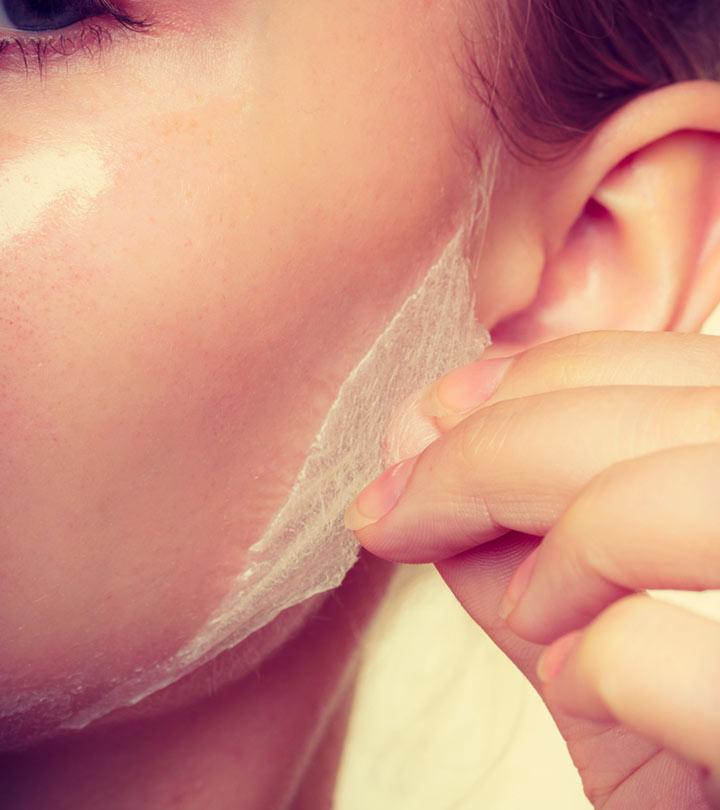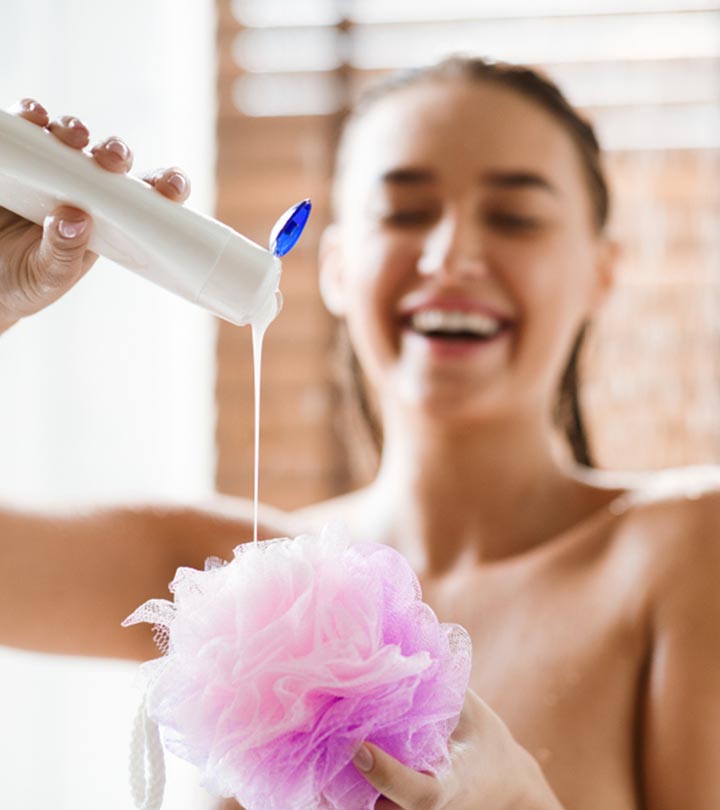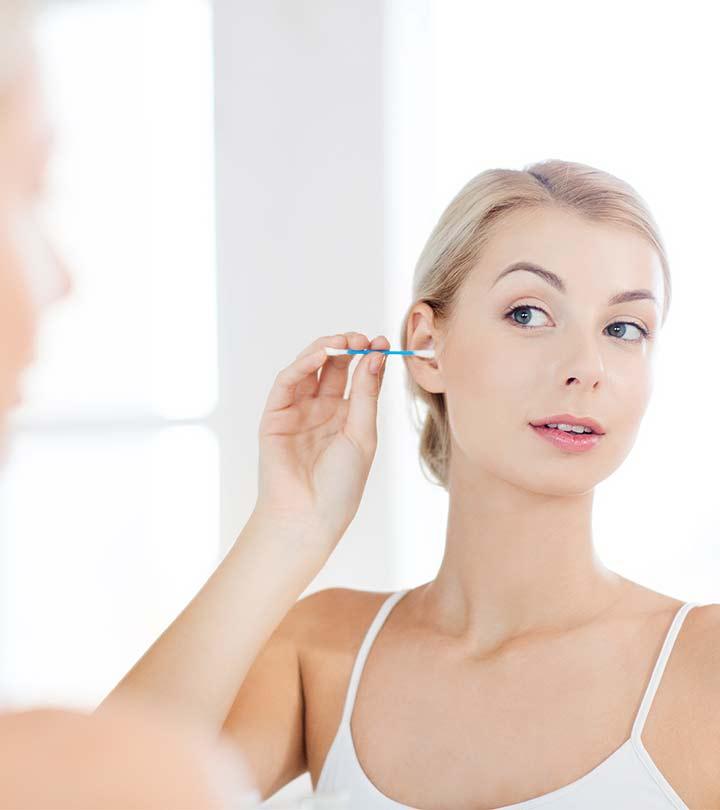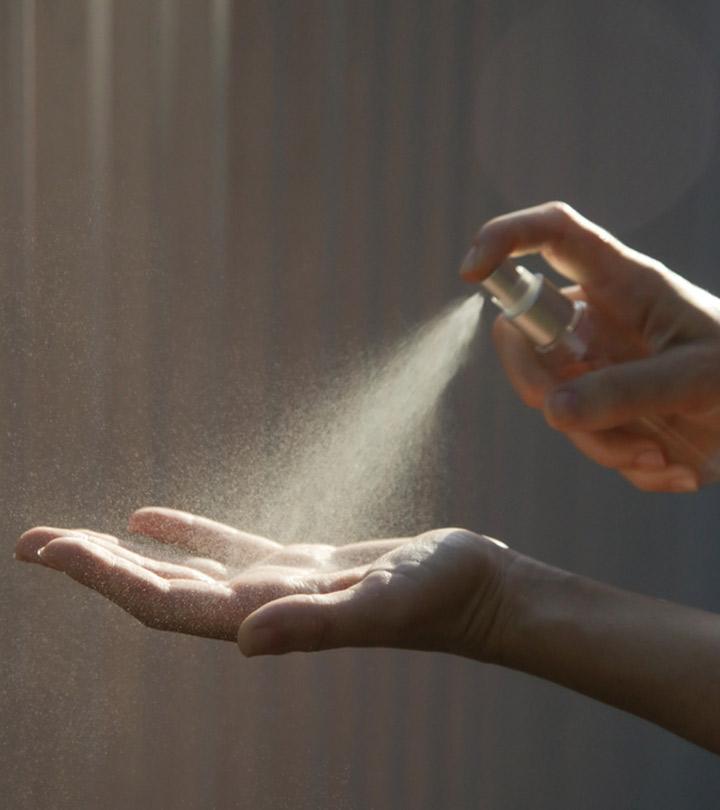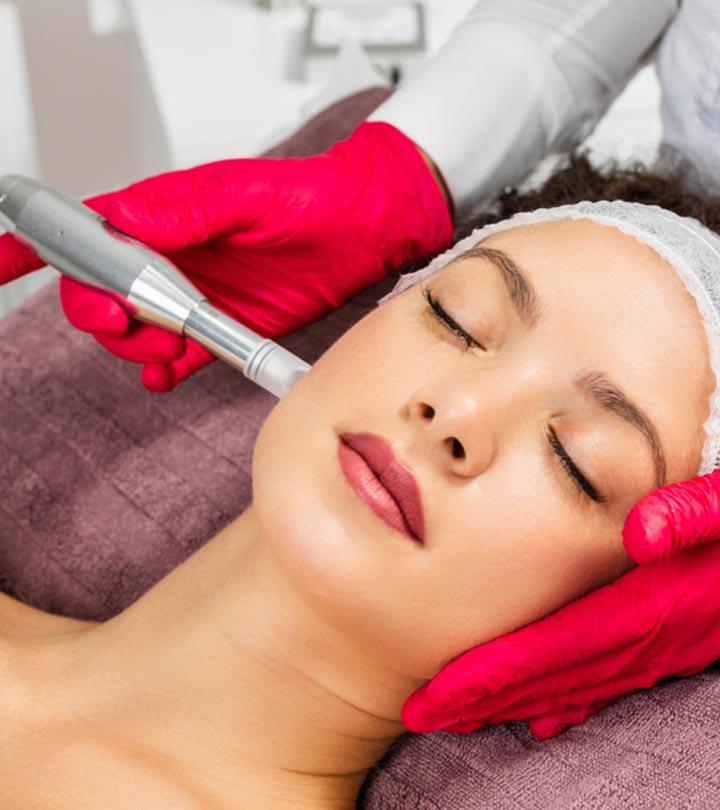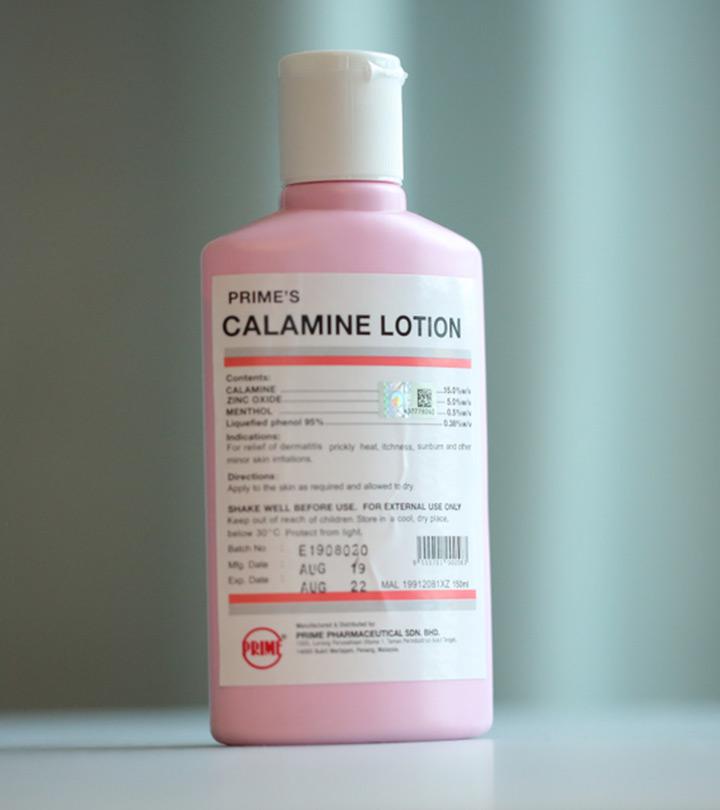Ear Eczema: Symptoms, Causes, Prevention, & Treatment Options
Detect the early signs to control this skin condition with some tender loving care.
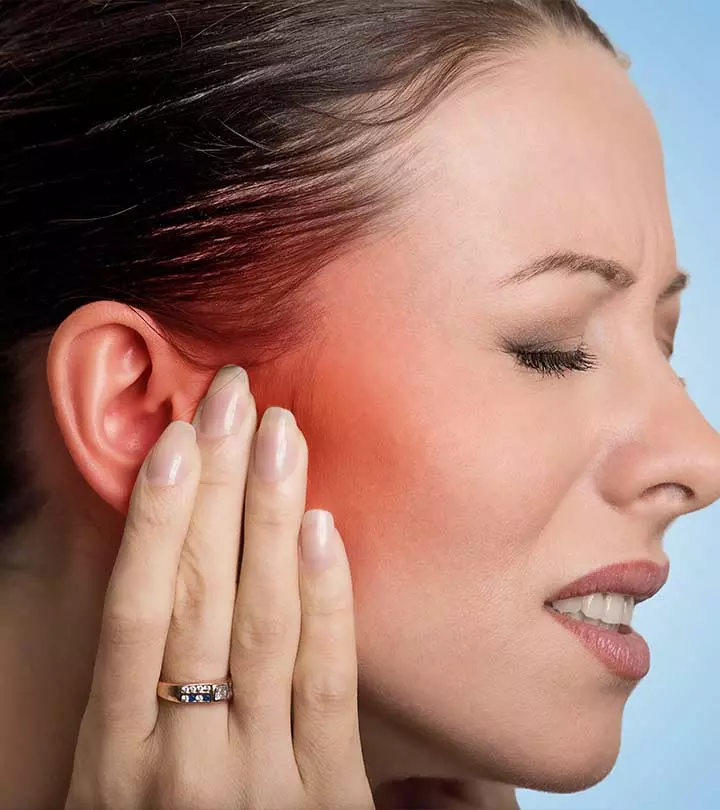
Image: Shutterstock
Eczema is an inflammatory skin condition that can occur anywhere on the body, including the ears. Eczema that develops in or around your ears can be more irritating than others as it can hinder your sleep. The symptoms of ear eczema can be visible in both the external and internal parts of the ear.
In this article, we will learn about the symptoms, causes, treatment, and prevention of ear eczema. Keep reading!
In This Article
What Is Eczema?
Eczema (atopic ear dermatitis) is a common skin condition. Environmental factors and genetics are thought to be the cause of this condition. In this condition, skin barrier dysfunction allows moisture to escape through the skin, leading to dehydrated skin. As a result, your skin becomes more susceptible to infection and allergies. This skin condition can affect any part of the body, like the elbows, wrists, ankles, knees, and ears (1).
When you have eczema, your skin becomes extremely dry and itchy. Scratching and rubbing the area can lead to rashes and blisters (1).
According to the American Academy of Dermatology, eczema or atopic dermatitis affects approximately 10% of the population at some point in their lives. It affects up to 25% of children and 2 to 3% of adults. It is estimated that around 60% develop eczema in their first year of life and 90% before the age of 5.
It causes ear itching and dry skin around the ear. It can also become painful.
Dr. Jennifer Haley, a board-certified dermatologist, says, “One difference between eczema in other areas of the body and ear eczema is that there may be a clear discharge from the ear. You should avoid scratching this area and aggravating the symptoms, which may lead to infections.”
 Trivia
TriviaDoes ear eczema occur only inside the ear? Find out in the next section.
Where Does Ear Eczema Occur?
Ear eczema can occur on all parts of your ear, like:
- Outside the ear (the conchal bowl).
- The opening of the ear.
- Ear lobes.
- Ear canal (external auditory canal).
- Ear folds.
- Behind the ear.
- Eardrums.
- The area where the ear meets the face.
People who are at risk of developing ear eczema include:
- People with a family history of eczema.
- People with sensitive skin.
- People living in higher altitudes and colder climates.
- People who have asthma.
- People with an oily scalp.
Ear eczema has some tell-tale signs that you need to look out for. Check them out below.
Symptoms Of Ear Eczema
The symptoms of ear eczema can be visible in both the external and internal parts of the ear. The main symptoms include:
- Cracked and dry skin
- Soreness
- Blisters
- Red, itchy skin
- Scaly skin
- Infected skin inside and outside the ear
- Clear discharge from the ear occasionally
- Swelling around the ear
- Crusting of the affected area
Scratching or rubbing the affected area can lead to ear inflammation and infection. In some rare cases, you may experience hearing issues. Cold weather may aggravate these symptoms.
Many things can trigger eczema. However, it is easy to manage and prevent if you are aware of the triggers. Continue reading to know more about the types and causes of ear eczema.
Types And Causes Of Ear Eczema
- Contact Dermatitis
Contact dermatitis or contact eczema develops when your skin comes in contact with a substance that prompts an allergic reaction from the immune system. Irritants like friction, occlusion, detergents, nickel, fragrance mix, chromium, shampoos, jewelry, hearing aids, and formaldehydei A flavorless, strong gaseous substance frequently used to disinfect surfaces, preserve lab samples and corpses, and protect tissues. can cause contact dermatitis. Poison ivy is considered the most common cause of allergic contact dermatitis in the United States (2).
- Atopic Eczema
People with atopic eczema have sensitive skin. A flare-up of this type of eczema causes dry and itchy skin. Environmental factors, genetics, and food hypersensitivityi A severe immune system reaction that usually occurs soon after consuming a particular food that contains an allergen. may be the cause of atopic eczema (3). It most commonly occurs behind the ear or the area of the ear that meets the face.
- Seborrheic Dermatitis
It is a common condition in areas with sebaceous glands that produce oil, including the ear. Therefore, the chances of getting this type of eczema in the ear canal are high. It results in scaling, ear redness, and crusty cracks in and around the ear. It can also cause lesions on the face, scalp, upper chest, and back (4).
- Asteatotic Eczema
This dermatological condition causes water loss from the epidermis, which results in dry and fissured skin. It appears mainly in the winter months when your skin is drier. It is also common among the elderly (5).
- Otitis Externa
An inflammatory condition that affects the ear canal that is caused either by eczema or a bacterial or fungal infection. Nevertheless, those with ear eczema are at risk of this ear canal infection (6). Other causes of this condition may include sweating, swimming, high humidity, and/or trauma to the ear canal. The surface of the skin becomes red or darker and results in swelling, itching, and discharge from inside the ear.
A blogger shared their experience of eczema in their blog. They said, “The doctor told me that my ear eczema was from the nickel in my earrings. So I had to avoid jewellery or only use gold in order to prevent my skin flaring up with red, raw, itchy patches (i).”
No one likes dealing with dry and itchy skin. So, how do you treat ear eczema? Find out in the next section.
Treatment For Ear Eczema
There is no cure for permanent eczema, but its symptoms can be treated with home remedies and medicines. The priority in treatment is to maintain the hydration and moisturization of the skin.
Here’s how you can treat it at home:
- Clean your ears with lukewarm water and dry them thoroughly.
- Moisturize your ears regularly. Use a fragrance-free moisturizer after stepping out of the shower.
- Protect your ears from the harsh winter weather. Cover them up with a hat, scarf, or earmuffs.
- Avoid certain allergens like cheap metal jewelry, fragrances, and hair products.
Medical remedies for ear eczema are the following:
- Medicated ointments and antifungal creams or gels can be used to treat ear eczema. Your doctor will prescribe treatment based on the type of eczema. It may be a topical steroid or a combination of both topical steroid and antifungal treatment.
- Calcineurin inhibitors are the latest drugs for eczema and are safer than steroids (7).
- If you have eczema in the ear canal, your doctor may prescribe steroid ear drops to reduce the itching and clear the ear rash.
- You may be prescribed an antibiotic if the eczema flare-up turns into an ear infection.
- In some cases, doctors prescribe oral antihistaminesi Allergy medications that stop allergy symptoms usually available as pills, chewable tablets, liquids, nasal sprays, and eye drops. for treating disturbed sleep due to itching. However, it is not recommended for daytime use.
Since there is no permanent cure, it is better to prevent eczema flare-ups by taking a few preventive measures. Read on to know more.
Prevention Tips For Ear Eczema
- Identify the triggers and try to avoid contact with them.
- Avoid showering with hot water. Instead, you may use lukewarm water.
- Use mild soaps and cleansers that are free of fragrances.
- Avoid using heavy perfumes and dyes.
- Moisturize your skin as soon as you step out of the shower. It will help lock in the moisture and prevent your skin from drying out.
- Cover your ears with a scarf or a hat during the dry winter months.
- Drink enough water to stay hydrated.
- Avoid jewelry that irritates your skin. You should especially steer clear of nickel. Instead, choose jewelry made of sterling silver, solid gold, or stainless steel.
- Use a cool-mist humidifier in your home when the air is dry.
 Quick Tip
Quick TipNow, let’s answer the most important question.
When Should You See A Doctor?
Usually, eczema can be treated at home with over-the-counter medications. But, if you cannot identify your triggers and want an expert diagnosis, you may consult a doctor. “The first thing your dermatologist will want to do is assess your eczema and make a diagnosis of where it comes from,” adds Dr. Haley. For example, your doctor may diagnose ear eczema by physical examination and analyzing current symptoms and family history. In some cases, you may need to take a skin test to figure out the allergens and triggers.
If over-the-counter treatments are not showing any results on eczema, you may have to seek medical help.
Differences Between Psoriasis And Ear Eczema
Psoriasis is an autoimmune skin condition where you experience an excessive buildup of skin cells that often present as raised, inflamed patches with a silvery-white scaly coating. It commonly affects the elbows, knees, and scalp, and can even extend to the ears (8). Ear eczema, on the other hand, is not an autoimmune condition. It causes redness, itching, and flaking. Unlike psoriasis, ear eczema may have varying triggers.
Infographic: Oil Massage For Ear Eczema
Ear eczema can be annoying and painful. Though there is no cure for this condition, you can soothe a flare-up by doing oil massages. Massaging your ears with diluted tea tree oil may help moisturize the skin and soothe otitis externa inflammation and redness of the external ear canal.
Check out the infographic below to learn how to massage your ears the right way. Illustration: StyleCraze Design Team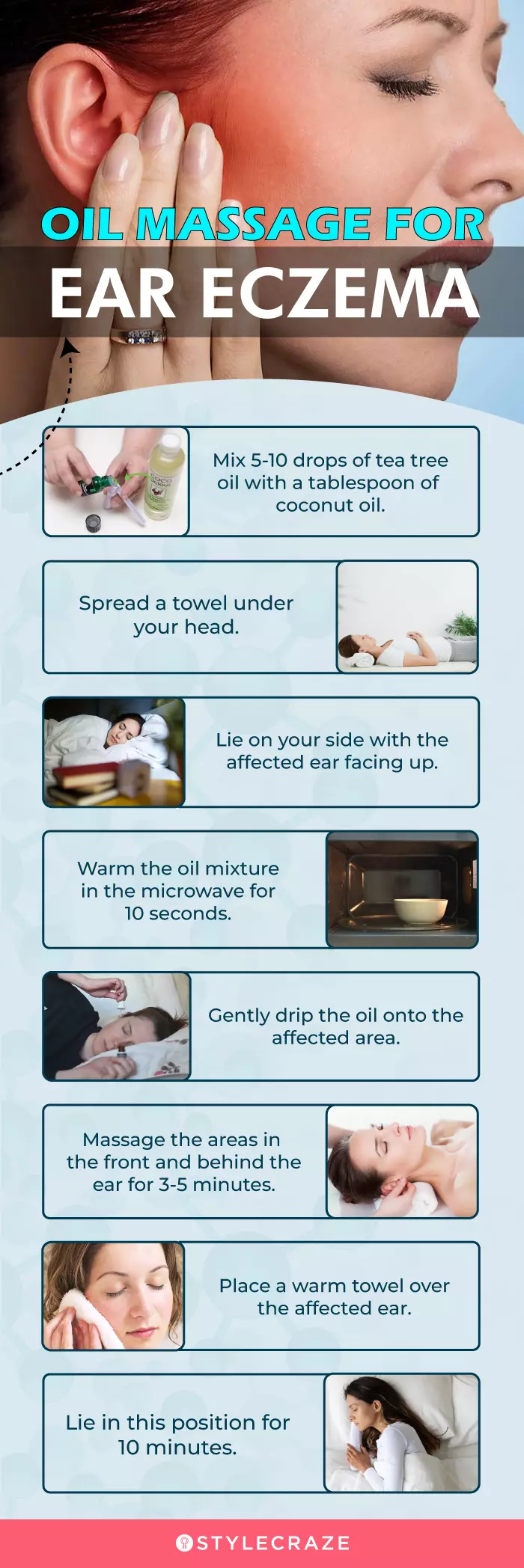
Ear eczema is an inflammatory skin condition characterized by dry and scaly skin, redness, ear pain, blisters, and ear swelling. Multiple factors such as genetics and exposure to environmental pollutants contribute to the development of eczema in the ear lobes, eardrums, and ear canal. While there is currently no cure for eczema, you can resort to home remedies and medical treatments for symptom management. For example, keeping your ears clean and using medicated creams and medications can reduce dry skin and itching. In addition, avoiding triggers and staying hydrated can minimize eczema flare-ups.
Frequently Asked Questions
Is Vaseline good for eczema?
Vaseline, a petroleum jelly, is readily accepted and works well on sensitive skin. It can be an excellent treatment for eczema flare-ups (1). In addition, petroleum jelly, unlike some other products, offers hydrating and soothing effects that help relieve inflammation, redness, and irritation.
Can headphones cause ear eczema?
Headphones and earbuds that go straight into the ears are a breeding place for sweat, germs, and dirt. The problem isn’t so much with excessive use as it is with improper cleaning. You may develop ear eczema if you do not regularly clean your earbuds or headphones.
Why is eczema worse at night?
Cortisol, a natural anti-inflammatory, is produced by the body during the day. Sadly, our cortisol levels fall during the night. This can reduce one’s natural defense against irritated, inflamed skin.
Key Takeaways
- Genetics and environmental factors are the main cause of ear eczema.
- Ear eczema can occur outside the ears, near ear lobes, ear canal, ear folds, or eardrums, and behind the ears.
- It can cause redness, itching, blisters, crusting around the ear and also ear discharge .
Moisturizing your ears daily, cleaning them regularly, protecting them from the harsh winter weather, and avoiding allergens can help you treat ear eczema at home.
Witness the incredible journey of a person with ear eczema before and after treatment. Check out the video below to know more about this amazing story.
Personal Experience: Source
StyleCraze's articles are interwoven with authentic personal narratives that provide depth and resonance to our content. Below are the sources of the personal accounts referenced in this article.
i. My battle of living with allergieshttps://battlingallergies247.wordpress.com/
References
Articles on StyleCraze are backed by verified information from peer-reviewed and academic research papers, reputed organizations, research institutions, and medical associations to ensure accuracy and relevance. Read our editorial policy to learn more.
- Moisturizers: The Slippery Road
https://www.ncbi.nlm.nih.gov/pmc/articles/PMC4885180/ - Contact dermatitis
https://www.ncbi.nlm.nih.gov/books/NBK459230/ - Atopic dermatitis
https://www.ncbi.nlm.nih.gov/books/NBK448071/#:~:text=Atopic%20dermatitis%20(AD)%2C%20which - Seborrheic dermatitis
https://www.ncbi.nlm.nih.gov/labs/pmc/articles/PMC2888552/#:~:text=Seborrheic%20dermatitis%20is%20a%20common - Asteatotic eczema
https://www.ncbi.nlm.nih.gov/books/NBK549807/ - National Eczema Society
https://eczema.org/information-and-advice/types-of-eczema/ear-eczema/#:~:text=ivy%20or%20oak - Topical Calcineurin Inhibitors for Atopic Dermatitis: Review and Treatment Recommendations
https://www.ncbi.nlm.nih.gov/pmc/articles/PMC3715696/ - PSORIASIS: SIGNS AND SYMPTOMS
https://www.aad.org/public/diseases/psoriasis/what/symptoms
Read full bio of Dr. Sravya Tipirneni
Read full bio of Anjali Sayee
Read full bio of Monomita Chakraborty





